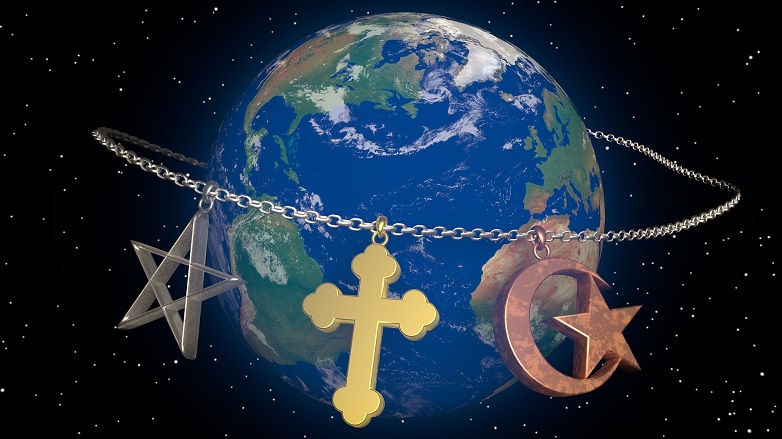By recognizing and respecting unknown gods, Abraham and Paul give Christians examples of how to honor other religious traditions.

Two Perspectives on World Religions
Conservative Christianity generally regards itself as the only legitimate faith. Where does this limited perspective come from? In this article, we’ll examine conservative, exclusive views. In honor of World Religions Day (January 15), we’ll also look at a more accepting perspective.
Conservative vs. Inclusive Approaches in the Hebrew Scriptures
In the Hebrew Scriptures, Moses represents a conservative approach. For the lawgiver, YHWH lives in constant competition with other gods. To establish the Jewish religion and maintain its position, Moses needs to struggle against the surrounding religions. Abraham, on the other hand, takes a more inclusive attitude.
Moses’ “Other Gods are Demons” Approach
Entering the land of Canaan and setting itself up as a nation, Israel has to distinguish itself from its neighbors. Growing up amidst Egyptian influences and then moving into the territory of Canaanite religion, nascent Judaism certainly doesn’t view its Deity as the only deity. They simply insist that their God is their God, to whom they owe loyalty. The plagues of the Exodus, then, are seen as attacks by YHWH on Egypt’s pantheon. When the Hebrew God beats the Egyptian gods, Pharaoh sets the Israelites free.
It isn’t until later that these other gods become demons in the Hebrew mindset. Deuteronomy 32.16-18 gives one example of this thinking:
They made him jealous with strange gods;
with abhorrent things they provoked him.
They sacrificed to demons, not God,
to deities they had never known,
to new ones recently arrived,
whom your ancestors had not feared.
You were unmindful of the Rock that bore you;
you forgot the God who gave you birth.
Leviticus 17.6-7 NRSV shares the same perspective, that those other gods are demons.
The priest shall dash the blood against the altar of the Lord at the entrance of the tent of meeting and turn the fat into smoke as a pleasing odor to the Lord, so that they may no longer offer their sacrifices for goat-demons, to whom they prostitute themselves. This shall be a statute forever to them throughout their generations.
The writings traditionally attributed to “Moses” are full of gods vying with each other for worship. In the Ten Commandments, the Hebrew people are to have no other gods before YHWH. This does not mean that people can’t recognize the existence of other spiritual beings that are considered gods. But if you let another take priority, that’s demonic.
Abraham’s Inclusive Approach
Moses views other gods as competition; Abram (Abraham) sees them as part of the family. Like in many households, relationships with the Divine get complicated. Abram’s approach to idols evolves over time. In “The Gods are Broken!” Rabbi Jeffrey K. Salkin writes about Abram’s father Terah, an idol-maker. One day, Abram smashes his father’s idols, giving birth to monotheism. God calls Abram out of the land of Ur, and presumably away from idolatry.
It’s important to note, however, that for Abraham, rejecting idols does not mean abandoning all foreign expressions of Deity. When he encounters Melchizedek, a priest of El Elyon, Abraham has some thinking to do. Abraham had never called God by this name before. He has to figure out whether Melchizedek’s El Elyon (Most High God) is the same as Abraham’s El Shaddai (God Almighty). In the end, he accepts this new expression of deity as Deity—because as evidenced by his giving a tithe to Melchizedek and sharing a ritual meal with the priest.
So, for Abraham, it doesn’t matter what you call God. Neither is your concept of the divine pantheon significant. (Melchizedek’s “Most High” implies henotheism, a bit different from Abraham’s monotheism.) What matters is the basic nature of that Divinity. Presumably, El Elyon is a loving god, unlike the others in the neighborhood who demand human sacrifice. So, our ideas of God’s character matter. Perhaps, because Melchizedek is the king of Salem (which means Peace), Abraham draws the conclusion that this El Elyon is a good god, and worthy of respect. Or, more likely as a monotheist, Abraham determines that El Elyon and El Shaddai are one and the same. Like a rose, which by any other name smells as sweet.
For a true monotheist, there are only three conclusions you can come to, regarding other deities. Either they are demons, they are nothing, or they are the same God under a different name. Abraham seems to have come to the third conclusion and taken an inclusive approach. His dealings with polytheistic and henotheistic neighbors bear this out.
Conservative vs. Inclusive Approaches in the New Testament
The world of the New Testament is a pluralistic one. Not only in Rome but around the empire, people worship deities from multiple pantheons. As far as the empire is concerned, it doesn’t matter who you worship, as long as you also sacrifice to the god Caesar. Emperor worship is, of course, abhorrent to Jews and Christians alike—and it gets both groups persecuted. When Christians declare, “Jesus is Lord,” they place Christ above every other religion and all human government. It’s in the spirit of competition that the conservative position finds supporting scriptures.
We do find another, more inclusive attitude, in some other New Testament scriptures. Jesus in the Gospel of John, Paul in the book of Acts, and the author of Hebrews all make a case for inclusiveness. We can find good, and even God, in other religions.
The “No Other Name” Approach
The conservative perspective points out that in the wilderness temptation, Satan wants Jesus to worship him. All religions that do not name Jesus as Lord, conservatives say, are false religions. Many conservative Christians even claim that Judaism, from which Christianity stems, is misled because Jews typically don’t recognize Jesus as the Messiah. Further, they claim that Islam is a false religion even though, like Judaism, it exalts the God of Abraham, Isaac, and Jacob. Conservative Christianity boldly quotes Acts 4.12, in which Peter asserts:
“There is salvation in no one else, for there is no other name under heaven given among mortals by which we must be saved.”
Conservative Christianity also loves to quote Jesus’ exclusivist statement to Thomas, who asks how the disciples can know the way. Jesus replies:
“I am the way, and the truth, and the life. No one comes to the Father except through me.”
When faced with those who disagree with it, conservative Christianity labels other teachings as “doctrines of demons (1 Timothy 4.1).” In its guardedness, fundamentalism insists that it has a corner on the market when it comes to the truth. People who worship the same God differently are wrong. And those who worship different gods are condemned.
The “Spirit and Truth” Approach
In contrast, Jesus seems to have tremendous respect for people of different faiths. Jesus marvels at the faith of the Roman centurion, even though the man serves Roman gods. Matthew writes:
“When Jesus heard him, he was amazed and said to those who followed him, “Truly I tell you, in no one in Israel have I found such faith.”
It isn’t surprising that Jesus can see good in the faith of a person who believes differently, and who worships other gods. Jesus himself is descended from Rahab, a pagan heroine whom the scriptures call “righteous.” To Jesus, sincerity matters more than correct belief or practice.
Jesus purposely goes to Samaria, where the people believe and worship differently from the Jews. There he met a woman who asked him whether her people were right, or whether the Jews were correct. Jesus says in John 4.21-24:
“Woman, believe me, the hour is coming when you will worship the Father neither on this mountain nor in Jerusalem. You worship what you do not know; we worship what we know, for salvation is from the Jews. But the hour is coming and is now here when the true worshipers will worship the Father in spirit and truth, for the Father seeks such as these to worship him. God is spirit, and those who worship him must worship in spirit and truth.”
For Jesus, sincerity matters more than anything else. Certainly, he recognizes that his beliefs are distinct from hers. He also believes his views to be, in a sense, truer. But he honors her quest for knowledge and encourages her earnest pursuit of God.
The “Unknown God” Approach
In Acts 17, Paul demonstrates a more inclusive perspective than he does in 1 Corinthians (if, indeed, he is the author of 1 Corinthians). As I say, “more inclusive,” I admit that he has some way to go before being truly affirming of other religions. While touring the Areopagus, Paul is distressed to see so many idols. He finds one statue dedicated “to an unknown god” and uses this as an entry point to discussing Christ.
While it’s high-handed and presumptive to think that Jesus is the “unknown god” that the sculptor intended, Paul does recognize that there is a greater spiritual reality beyond the carved stone. While he never admits that Greek religion is truth, he demonstrates that he believes it contains truth. Perhaps learning to honor other religions is a process, and some Christians aren’t yet ready to proclaim the goodness of alternate faiths. That’s okay—if you’re not there, you’re not there. But you can be like Paul and see the presence of Christ even in religions that are different from your own.
Melchizedekian Priesthood
Perhaps the author of Hebrews comes farthest in understanding that God is present in other belief systems. She creatively draws from the story of Abraham and Melchizedek in Genesis 14, superimposing Jesus on the story. The author makes Melchizedek a type of Christ. The King of Salem (Shalom) becomes analogous to Jesus, the Prince of Peace. The author equates the unmentioned lineage of Melchizedek with the eternal quality of Christ. Melchizedek does not seem to come from a priestly line, yet he is the priest of El Elyon. In the same way, Jesus who does not come from a priestly family becomes the heavenly high priest. The author calls Jesus a high priest, “in the order of Melchizedek.”
Don’t let this escape you. Jesus is a priest in the same order as a pagan king. We have no evidence of any particular doctrine that Melchizedek preached—yet the author of Hebrews equates Jesus with this leader of another religion. That’s because, for Jesus, it doesn’t matter whether you call God “El Elyon,” “El Shaddai,” “Father,” or “Mother.” It’s irrelevant whether you worship on this mountain or in that temple. What matters is your sincerity—whether you follow God in spirit and truth.
Bridging the Divide
Jesus never intended to establish a religion. He came to show us eternal life—a way of living in the Sacred Present, which he called the Realm of God. He longed to teach us the value of self-sacrifice—not as an atonement but as a way toward at-one-ment with those who are estranged. He came to show us that instead of imagining ourselves sinfully separate from God, we can know that we’ve never been disconnected from the Divine Parent. In these things, we can find wholeness and peace.
Then, we can extend that peace to our neighbors. When Christians pit ourselves against Muslims, Jews, Hindus, Sikhs, Buddhists, Neopagans, or anyone else, we’re missing the point. As Christians, we are supposed to become like Jesus, who saw great faithfulness in people from other religions. Like Jesus, when we make shalom our religion, we too can become priests in the order of Melchizedek. And that’s a priesthood that bridges the divide between all people of every faith.
How can we bridge the divide between people of different faiths? By listening nonjudgmentally. By attending to the needs of other people without trying to convert them to our way of thinking. We bridge the divide when we think of others as equal bearers of the Divine Image, regardless of their faith or lack thereof. When we do works of justice and charity, not as inroads to evangelism, but for the simple goodness of helping. When we forge friendships that appreciate people for their differences as much as respect their similarities, we cross the chasm that separates us. This is the work of Christ—a work that goes far beyond the name of Christianity.













